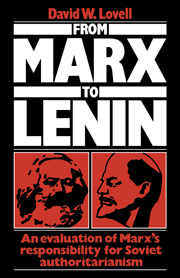3 - Engels, democracy and revolution
Published online by Cambridge University Press: 05 November 2011
Summary
Frederick Engels played a decisive role in systematizing and extending Marx's project or, as McLellan writes, in transforming ‘Marx's views into a Weltanschauung, a philosophical system, an interpretation of the world’. This role began a few years before Marx's death, when Engels published a polemic against Eugene Dühring, whose theories were then in vogue among German socialists, taking the opportunity to set down Marx's ideas in a popular and systematic form. Engels' later pamphlet Socialism: Utopian and Scientific, culled from Anti-Dühring, became the standard introduction to Marxism for vast numbers of Social Democrats, many of whom were not even familiar with the Communist Manifesto. In his last and most productive period, which coincided with the period after Marx's death in 1883, Engels undertook the defence and explication of the Marxism of Anti-Dühring. In the field of political economy he edited the last two volumes of Marx's magnum opus, Capital (volume II was published in 1885, and volume III in 1894); in the field of philosophy he wrote Ludwig Feuerbach and the End of Classical German Philosophy (1888), and the notes published after his death as the Dialectics of Nature; in the field of history (and anthropology) he wrote, inter alia, The Origin of the Family, Private Property, and the State (1884); and his letters abound with practical political advice to Social Democrats in many parts of the world.
- Type
- Chapter
- Information
- From Marx to LeninAn evaluation of Marx's responsibility for Soviet authoritarianism, pp. 71 - 89Publisher: Cambridge University PressPrint publication year: 1984



